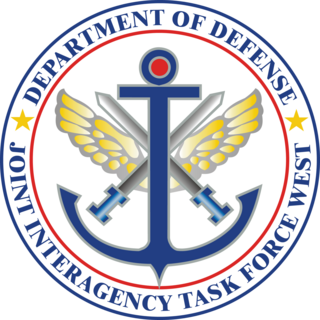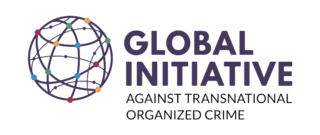
Europol, officially the European Union Agency for Law Enforcement Cooperation, is the law enforcement agency of the European Union (EU). Established in 1998, it is based in The Hague, Netherlands, and serves as the central hub for coordinating criminal intelligence and supporting the EU's member states in their efforts to combat various forms of serious and organized crime, as well as terrorism.

The Federal Criminal Police Office of Germany is the federal investigative police agency of Germany, directly subordinated to the Federal Ministry of the Interior. It is headquartered in Wiesbaden, Hesse, and maintains major branch offices in Berlin and Meckenheim near Bonn. It has been headed by Holger Münch since December 2014.

Anti-Money Laundering (AML) refers to a set of policies and practices to ensure that financial institutions and other regulated entities prevent, detect, and report financial crime and especially money laundering activities. Anti-Money Laundering is often paired with the action against terrorism financing, or Combating the Financing of Terrorism, using the acronym AML-CFT. In addition arrangements intended to ensure that banks and other relevant firms duly report suspicious transactions, the AML policy framework includes financial intelligence units and relevant law enforcement operations.
Terrorism financing is the provision of funds or providing financial support to individual terrorists or non-state actors.

The Organized Crime Drug Enforcement Task Force (OCDETF) is a federal drug enforcement program in the United States, overseen by the Attorney General and the Department of Justice. The principal mission of the OCDETF program is to identify, disrupt, and dismantle the major drug trafficking operations and tackle related crimes, such as money laundering, tax and weapon violations, and violent crime, and prosecute those primarily responsible for the nation's drug supply.
Transnational crimes are crimes that have actual or potential effect across national borders and crimes that are intrastate but offend fundamental values of the international community. The term is commonly used in the law enforcement and academic communities. Transnational organized crime (TOC) refers specifically to transnational crime carried out by crime organizations.

The Anti-Narcotics Force is a federal executive bureau and a paramilitary force of the Government of Pakistan, tasked with combating the narcotics smuggling and use within Pakistan. ANF works under the umbrella of Pakistan Army and Ministry of Narcotics Control (Pakistan) of which Mohsin Raza Naqvi is the minister since March 2024. Due to misconception on Section 4 of ANF ACT 1997, the force's head consisted of the active-duty general officer of Pakistan Army. Although the law prescribes that any competent person may be appointed as Director-General. Currently, a two-star Army Officer, Major general Muhammad Aniq Ur Rehman Malik is deputed as Director-General. The ANF also has sole responsibility for coordinating and pursuing Pakistan narcotics investigations abroad.
Law enforcement in Azerbaijan comes under the control of the Ministry of Internal Affairs of Azerbaijan, which administers the National Police of the Republic of Azerbaijan. Admitted to the Organization for Security and Co-operation in Europe (OSCE) on 30 January 1992, with an OSCE office opening in Baku on 16 November 1999. It is a member of INTERPOL.

Financial crime is crime committed against property, involving the unlawful conversion of the ownership of property to one's own personal use and benefit. Financial crimes may involve fraud ; theft; scams or confidence tricks; tax evasion; bribery; sedition; embezzlement; identity theft; money laundering; and forgery and counterfeiting, including the production of counterfeit money and consumer goods.
The CARICC is a Central Asian anti-drug trafficking organization.
The ASEAN Wildlife Enforcement Network (ASEAN-WEN) was officially launched on 1 December 2005, as a regional inter-agency and inter-governmental initiative to counter the illegal cross-border trade in endangered flora and fauna. It helps countries share information on and tackle cross-border wildlife crime and facilitates the exchange of regional best practices in combating those crimes. As the world's largest wildlife law enforcement network, it comprises the law enforcement agencies of the 10 ASEAN countries forming a regional intergovernmental law-enforcement network.

Joint Interagency Task Force West is a standing United States military joint task force with the mission of combating drug-related transnational organized crime in the Indo-Asia-Pacific. JIATF West's area of responsibility (AOR) is that of United States Indo-Pacific Command (USINDOPACOM). JIATF West is one of two Joint Interagency Task Forces with a counter-narcotics mission. The other is Joint Interagency Task Force South. The task force is run as USINDOPACOM's "executive agent" for counterdrug activities providing support to partner nation law enforcement. Approximately 100 active duty and reserve U.S. military forces; Department of Defense civilian employees; contractors; and U.S. and foreign law enforcement agency personnel are members of the task force.
The Paris Pact Initiative is an international partnership aimed at combating Afghan opiates trafficking, consumption and related problems in countries along the Afghan opiates trafficking routes. The Initiative dates back to a meeting titled the Ministerial Conference on Drug Routes from Central Asia to Europe that was held in Paris on 22 May 2003. The participants of the meeting adopted the so-called "Paris Statement", later followed by the Moscow Declaration and the Vienna Declaration.

The Blue Heart Campaign is an international anti-trafficking program started by the United Nations Office on Drugs and Crime (UNODC). Established in 1997, the UNODC supported countries in implementing three UN drug protocols. In 2000, after the UN General Assembly adopted the Protocol to Prevent, Suppress and Punish Trafficking in Persons, the UNODC became the “guardian” of that protocol and assumed the functions of fighting against human trafficking. The Blue Heart Campaign was launched in March 2009 by the Executive Director of the UNODC, Antonio Maria Costa, during his address to the World's Women's Conference meeting in Vienna. The campaign's symbol is a blue heart. The Blue Heart Campaign uses its website, as well as Facebook, Twitter, YouTube, and Flickr to communicate goals, objectives, and news with the public.
The Secretariat for Multidimensional Security of the Organization of American States is a part of the General Secretariat, which is headquartered in Washington, D.C., United States. The Secretariat for Multidimensional Security has a mandate to promote cooperation between Organization's Member States, Inter-American and international organizations, as well as with entities such as the United Nations and its subsidiaries, in order to analyze, prevent, confront and respond to security threats.
United Nations Security Council Resolution 2195 was adopted unanimously by the UN Security Council on 19 December 2014. The resolution followed a debate initiated by Foreign Minister of Chad who explained the need to adopt international measures to prevent terrorists from benefiting from multi- national organized crime. This would include cases of arms trafficking, human trafficking, drug trafficking, using aircraft for illegal trade, trade in minerals, kidnapping, extortion and bank robberies. Countries of United nation members were asked to fortify guarding their borders in order to restrict the freedom of movement of terrorists.

The Global Initiative Against Transnational Organized Crime, sometimes shortened as Global Initiative, is an international non-governmental organization headquartered in Geneva. The organisation is composed of a network of law enforcement, governance and development practitioners, who share the objective of developing innovative strategies and responses to organized crime. In July 2020, the network counted 500 experts.

Crime in Latvia is relatively low, by global standards, especially compared to previous years, when it was named the "crime capital of Europe" by Forbes in 2008. The homicide rate in Latvia was 4.9 per 100,000 people in 2020, a sharp drop from 10 cases per 100,000 people in 2000, and has been steadily decreasing, but has seen recent increases. The United States Department of State has assessed Latvia's security rating as "medium", with a moderate crime rate. In recent times, crime has been increasing, particularly due to many Latvians stranded because of the COVID-19 pandemic returning to Latvia and choosing to commit crime. According to Interpol, Latvia is considered an attractive place for regional and organized criminals involved in drug trafficking, arms trafficking, human trafficking, or smuggling. According to the Central Statistical Bureau of Latvia, a third of all women in Latvia have suffered some form of sexual violence or rape while men are subjected to violence outside the family.
Fisheries crime describes the wide range of criminal activity that is common along the entire value chain of the fishing sector. It often occurs in conjunction with Illegal, unreported and unregulated fishing (IUU), but next to illegal fish extraction include for example corruption, document fraud, tax evasion, money laundering, kidnapping, human trafficking and drug trafficking. The issue recently received increased attention in the UN, Interpol, and several other international bodies.
Operation Dark HunTOR was an international law enforcement operation targeting opioid trafficking and other illegal activities on The Onion Router (TOR). The operation, which was conducted across the United States, Australia, and Europe, over a period of 10 months. In addition Europol released a statement that said the operation was composed of a series of separate but complementary actions in Australia, Bulgaria, France, Germany, Italy, the Netherlands, Switzerland, the United Kingdom and the United States, with coordination efforts led by Europol and Eurojust; which greatly expands on the initial number of countries that the US press releases indicated.










